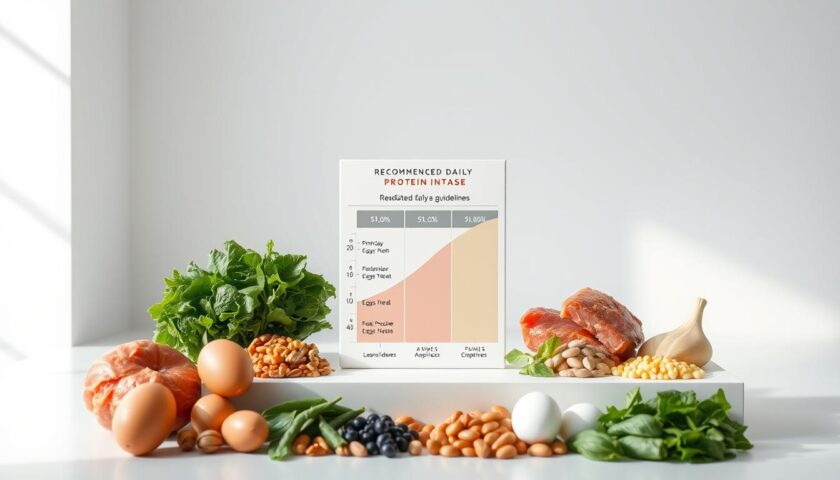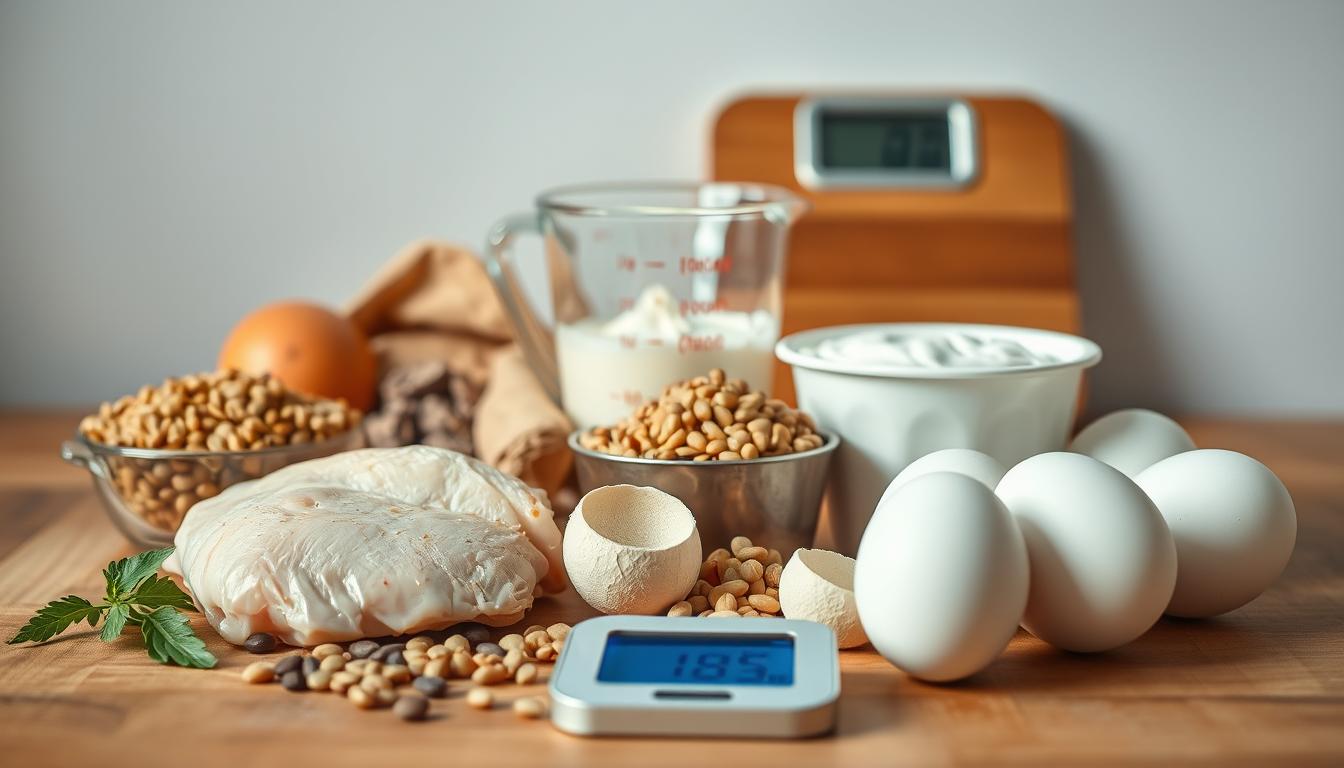A surprising fact is that most people in the U.S. meet or exceed the recommended protein intake. The average adult consumes around 88 grams of protein per day. This raises questions about the optimal daily protein requirement and how much protein should I eat in a day.
The recommended daily allowance (RDA) is 0.8 g/kg per day for adults aged 18 years or greater. But, this may vary based on age, sex, and overall health. It’s important to understand the protein intake per day.
According to the Institute of Medicine (IOM), adults aged 19 years and older should consume 10% to 35% of their daily calories from protein. This is about 200 to 700 calories from protein for a 2,000-calorie diet. This highlights the importance of determining the optimal daily protein intake to maintain a healthy lifestyle.
Understanding the optimal daily protein requirement is crucial for maintaining a healthy lifestyle. It’s essential to consider the protein intake per day. The optimal daily protein intake is a topic of much debate, with varying recommendations from different health organizations. It’s vital to explore the science behind protein requirements and provide evidence-based guidelines for daily protein intake.
Key Takeaways
- The recommended daily allowance (RDA) is 0.8 g/kg per day for adults aged 18 years or greater.
- The optimal daily protein intake may vary depending on factors such as age, sex, and overall health.
- Most people in the U.S. meet or exceed the recommended protein intake, with the average adult consuming around 88 grams of protein per day.
- The Institute of Medicine (IOM) recommends adults aged 19 years and older to consume 10% to 35% of their daily calories from protein.
- Understanding the protein intake per day is essential to maintain a healthy lifestyle and determine the optimal daily protein requirement.
- The optimal daily protein requirement is a topic of much debate, with varying recommendations from different health organizations.
The Science Behind Protein Requirements
Protein is vital for our bodies. It helps with muscle growth, immune function, and making enzymes and hormones. The daily protein intake varies, but it’s usually between 0.8 and 1 gram per kilogram of body weight.
For example, a 170-pound person needs at least 61.6 grams of protein each day. This amount can be met by eating a variety of protein-rich foods.
Studies suggest that protein should be about 10 to 35% of our daily. Our protein needs change based on age, sex, weight, and how active we are. Athletes, for instance, might need more protein to support their training.
- 0.8 grams of protein per kilogram of body weight for sedentary adults
- 1.2 to 2 grams of protein per kilogram of body weight for endurance or strength athletes
- 1 gram of protein per kilogram of body weight for older adults
Remember, everyone’s protein needs are different. Your recommended intake might change based on your health and how active you are.
How Much Protein Should I Eat in a Day: Evidence-Based Guidelines
The amount of protein you should eat daily depends on several factors. These include your age, sex, weight, and how active you are. The Dietary Guidelines for Americans recommend that adults get 10–35% of their calories from protein. For example, a 150-pound woman might need 54 grams of protein each day. On the other hand, a 180-pound man might need 65 grams.
To find the right amount of protein for you, it’s important to look at the protein daily target and guidelines. This helps ensure you get enough protein for your body’s needs.
A study on protein intake guidelines shows that the recommended amount changes with age, sex, and health. Here’s a table that shows the recommended daily amount of protein for different groups:
| Age and Sex Group | RDA (g/day) |
|---|---|
| Babies (6-11 months) | 11 |
| Children (1-3 years) | 13 |
| Children (4-8 years) | 19 |
| Males (9-13 years) | 34 |
| Males (14-18 years) | 52 |
| Males (19-70 years and older) | 56 |
| Females (9-13 years) | 34 |
| Females (14-70 years and older) | 46 |

Remember, your protein needs can change based on your activity level and health. By following the protein intake guidelines and setting a daily target, you can make sure you’re getting enough protein.
Conclusion: Making Informed Protein Intake Decisions
To find the right daily protein intake, you need to think about your age, sex, weight, and how active you are. The Recommended Dietary Allowance (RDA) is 0.8 grams per kilogram of body weight. This is good for most healthy people. But, athletes, active folks, and older adults might need more protein for muscle repair and health.
Following the guidelines in this article helps you decide on your protein intake per day. It’s key to know the dangers of too much or too little protein. Make sure you get all the nutrients you need. With a focus on your own nutrition and a healthy lifestyle, you can find the best protein daily recommended amount for you.
FAQ
What is the recommended daily protein intake?
The amount of protein you should eat daily depends on several things. These include your age, sex, weight, and how active you are. The Dietary Guidelines for Americans say adults should get 10-35% of their calories from protein. This means 0.8-1.2 grams of protein per kilogram of body weight each day.
How much protein can the body absorb per meal?
Studies show the body can take in up to 30 grams of protein at a time. But, how much you can absorb might change based on your age and health.
What factors affect individual protein needs?
Several things can change how much protein you need. These include your age, sex, weight, and how active you are. Also, health conditions like kidney disease or diabetes can play a role.
Is the recommended protein intake the same for everyone?
No, it’s not the same for everyone. Your protein needs can vary based on your age, sex, weight, and activity level. The RDA of 0.8 g/kg per day might not be enough for those who are very active or have certain health issues.
When is the best time to consume protein?
Some studies suggest eating protein evenly over three meals might help with muscle growth and repair.
Source Links
- https://www.eatingwell.com/article/290496/this-is-how-much-protein-you-need-to-eat-every-day/
- https://www.health.com/nutrition/right-amount-protein-eat-every-day-meal-ideas
- https://health.clevelandclinic.org/how-much-protein-you-need
- https://www.healthline.com/health-news/how-much-protein-per-day-build-muscle
- https://www.medicalnewstoday.com/articles/protein-intake
- https://www.unitypoint.org/news-and-articles/how-much-protein-do-you-need-daily-ideal-protein-intake-for-muscle-growth-weight-loss-and-managing-chronic-conditions
- https://www.nm.org/healthbeat/healthy-tips/how-much-protein-do-you-really-need
- https://swolverine.com/blogs/blog/the-science-behind-protein-intake-how-many-grams-of-protein-per-day-do-you-really-need?srsltid=AfmBOorlFUb3VUocW4eSIEnzXKh6GsR-JJSSYTtiSZuTw1qqJgGcgzDA
- https://breathemiami.us/protein-101-how-much-protein-do-i-need/
- https://pmc.ncbi.nlm.nih.gov/articles/PMC11022925/
I am Lazar Bojic, an established professional in digital marketing with almost a decade of experience. Specializing in an array of niches has been my main strength as a content creator. Besides being a content writer, I have participated in creating various other content types, including infographics and script writing for video content creators, across numerous niches. Among my standout works, content creation at wikibiography.in certainly holds a special place.

